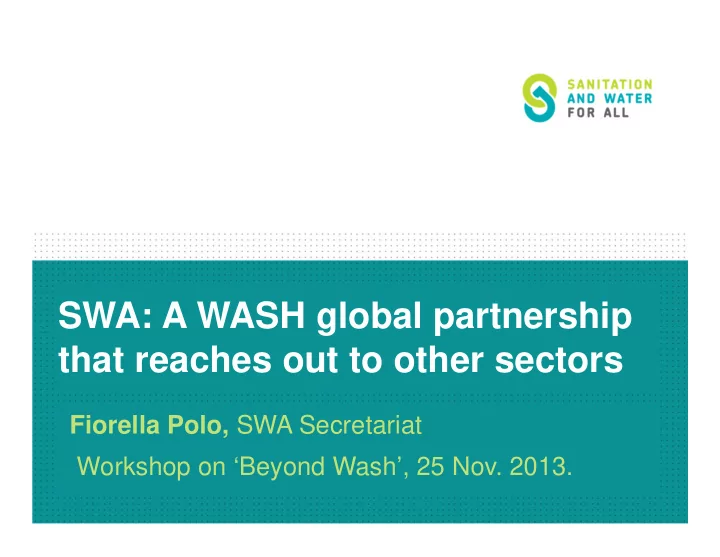

SWA: A WASH global partnership that reaches out to other sectors Fiorella Polo, SWA Secretariat Workshop on ‘Beyond Wash’, 25 Nov. 2013.
What is Sanitation and Water for All?
A partnership of over 90 partners from 7 constituencies Developing Developing Donors Donors Civil Society Civil Society countries countries Development Development Research & Research & Multilaterals Multilaterals banks banks learning learning Sector Sector Partners Partners 3
What is the problem that SWA seeks to address? Despite the great need and enormous benefits, the water, sanitation and hygiene (WASH) sector has historically faced major obstacles
WASH is low on the political agenda Political and financial decision-makers unaware of the fundamental importance, or the multiple benefits, of WASH improvements WASH faces many competing priorities Lack of institutional leadership, capacity and resources impedes progress 5
Comprehensive national plans are not being developed and implemented Lack of adequate institutional capacity Lack of human resource capacity Lack of consultation with key sector stakeholders Lack of reliable information Undermines credibility with investors 6
Low levels of mutual accountability between developing countries & donors, and between developing country governments & their citizens Over the period 2002 – 2010, data show that donors did not release US$17 billion of the US$54 billion of aid committed to the water and sanitation sector 7
SWA Theory of Change Higher political priority for sanitation and water • Supported by a clear evidence base; • Strong country processes; and • Strong sector collaboration Leads to: • Greater attention to WASH • Better investment decisions • Larger impact Showing more impact ignites a virtuous cycle to build momentum to take service delivery and behavior change to scale. 8
SWA Virtuous Circle LEADERSHIP POLITICAL COMMITMENTS COURSE ALTERATIONS WASH PRIORITIZATION SWA HLM ACCOUNTABI GOVERNANC LITY E SECTOR COORDINATION GLAAS CSO/BATs MONITORING COUNTRY PLANS/ACTION ANALYSIS 9
What does SWA do to address the problem?
SWA focus areas 1.Prioritize WASH at the highest political levels 2.Generate strong evidence/use to improve decision making 3. Strengthen national processes 1. Increased impact of resources 2. Strengthened mutual accountability Sanitation and water for everyone 11
SWA Activities • High Level Meetings • High Level Commitments Dialogue • Reporting on Commitments • Advocacy around commitments • Engagement with other Sectors/ Ministry of Finance • Harmonization/alignment of global WASH monitoring • Strengthening of country processes 12
High-Level Meetings In 2010 and 2012. Next HLM will be in April 2014 Gathers Ministers of Finance from developing countries, Ministers of Development Cooperation from donor countries and high level representatives from development banks. Donors agree to address the fundamental bottlenecks holding back progress and to act on international aid effectiveness principles. 13
At the 2012 HLM, unprecedented political leadership 14
2012 HLM commitments:> 400 by both countries and donors Screen-shot on commitments from website; both circles and the histogram Political Evidence National Prioritization Based Decisions Processes 15
From meetings to ongoing dialogue (HLCD) 2012 2014 2010 HLM HLM HLM Attention/Effort 1. 2013 2015 Monitoring Monitoring 2. Advocacy on commitments 16
Tracking of commitments as main accountability mechanism • Good progress has been made; however, additional effort is needed to fulfill commitment s by 2014. • Partners tool accountability seriously. 100% reported back one year later 17
Highlight of the 2012 HLM Joint advocacy at country level Heads of State Finance ministers and ministry staff / advisors Ministers responsible for sanitation and water Parliamentarians District commissioners Local government Citizens 19
Learning from Senior Finance Ministry Officials on decision-making for WASH Officials to Discuss Decision-making 20
Role of Finance Ministers in shaping WASH investments • Finance Ministers consider themselves stewards of scarce resources • They want value for money • They are driven to grow the economy – so want to know how WASH will contribute • Need to know not only that WASH is a good investment, but which kinds of WASH investments constitute value for money • Are interested in links to other sectors 21
Perceptions of the WASH Sector • Some perceived weaknesses: • Fragmentation – multiple ministries involved • Lack of data • Weak absorptive capacity • Poor record of sustainability • Finance Ministries want to see multiple ministries engaged to ensure cohesion • Finance Ministers are frustrated by WASH Sector inability to demonstrate and track progress 22
At country level: Implement learing: Opportunistic and achievable activities around targeted messages Partners are encouraged to: • Work as a sector – government, donors, development partners, civil society • Aim to speak with one sector voice • Highlight critical issues to be addressed • Demonstrate how the sector is working together more effectively
What are the results of SWA?
HLCD influence: reported by countries and donors • Strengthened relationships with ministries of finance • increased budget allocations and increased interest in implementation by MOFs • Increased prioritization of sanitation • further buy-in for and scaling up of CATS • Strengthened visibility of the WASH sector within technical ministries • stronger support to the sector • Strengthened dialogue within the sector • improved coordination 25
We will be judged by our actions and not by our words” - H.E. John Agyekum Kufuor, Chair of SWA and former President of Ghana
Recommend
More recommend